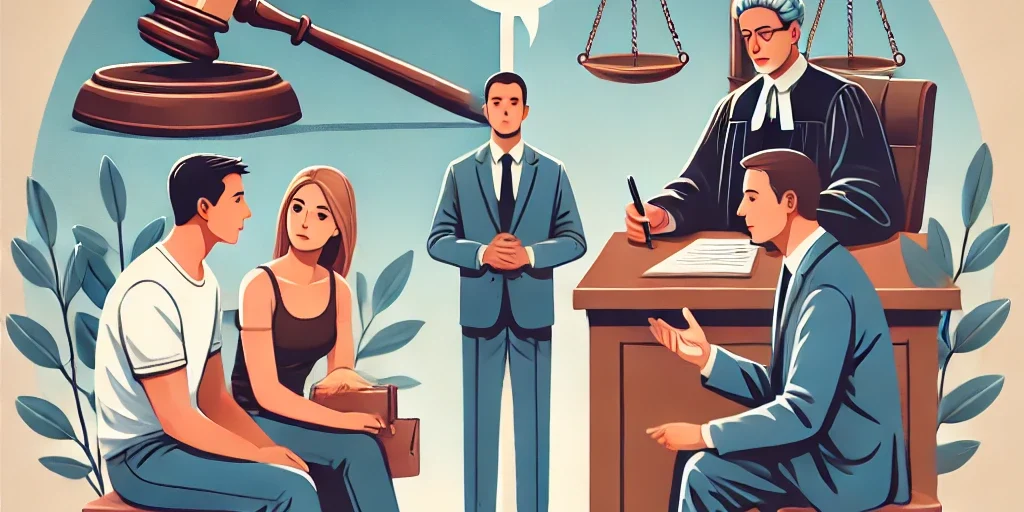When you are going through a divorce, you may be offered mediation. Mediation is valuable, as it can help you traverse disputes and possibly reach a settlement without ever needing to appear in court. In New Jersey, there are two kinds of mediation: private mediation and court-ordered mediation. Let’s learn more about mediation and these two types, so you can decide which is the better option.
Key Takeaways
- Mediation helps divorcing couples resolve disputes with the aid of a neutral mediator.
- Court-ordered mediation in New Jersey is mandatory for divorces involving children and focuses on custody and parenting time.
- Private mediation is voluntary and allows couples to address all divorce issues, including finances, with more control and privacy.
- The best type of mediation depends on your divorce’s complexity—court-ordered for child-related issues, private for broader flexibility.
- Consult a divorce attorney to determine the right mediation option for your needs.
Court-Ordered vs. Private Mediation in NJ Divorce
| Aspect | Court-Ordered Mediation | Private Mediation |
|---|---|---|
| Mandatory Requirement | Yes, for divorces with child custody issues | No, entirely voluntary |
| Focus Areas | Primarily child custody and parenting time | All divorce issues, including finances |
| Mediator Selection | Assigned by the court | Selected by the couple |
| Privacy Level | Lower, as records may be public | Higher, confidential proceedings |
| Flexibility | Limited to court schedules | More flexible, based on the couple’s needs |
| Cost | Generally lower as court-appointed | Potentially higher due to mediator fees |
| Legal Representation | Optional, but can consult an attorney | Recommended for legal advice and protection |
| Outcomes | Non-binding; court will intervene if unresolved | Binding if both parties agree; enforceable in court |
What is Mediation?
This is an important question to answer. Mediation is a process that allows for individuals to resolve disputes in a less formal setting. You may have experienced mediation at work, for example. The goal of mediation is to help two parties communicate more effectively while working towards some kind of settlement. Often, the mediator who helps facilitate communication is neutral and not a legal representative. Furthermore, the mediator will not make decisions for you; they are not a judge.
What is Court-Ordered Mediation?
Court-ordered mediation is a mandatory process that divorcing couples in New Jersey may be required to attend. This type of mediation focuses primarily on child custody and parenting time. In most cases, when couples with children file for divorce, the court mandates them to participate in this form of mediation to encourage cooperative decision-making in the best interests of the child. During these sessions, a neutral mediator appointed by the court helps both parties come to an agreement on child-related matters without needing a trial.
While the goal is to foster a mutually beneficial resolution, court-ordered mediation has certain limits. It is typically not used to address financial issues, and the mediator does not make decisions for the couple. Instead, they guide the conversation, helping both parties find common ground. If the couple cannot agree, the unresolved matters may move forward to court.
In New Jersey, divorces involving children often require court-ordered mediation to address custody and parenting time issues. This process encourages cooperative decision-making, with resources available through the New Jersey Courts on Family Mediation.

Are All Divorcing Couples Required to Do Mediation?
Are All Divorcing Couples Required to Do Mediation?
Not all divorcing couples are required to undergo mediation. For more information on whether your case qualifies, refer to the official guidelines on Divorce in New Jersey provided by the New Jersey Courts. Couples without children may not need court-ordered mediation, and those with amicable separations often resolve their disputes without it. However, if a divorce involves significant conflict over child custody or visitation rights, the court will likely mandate mediation as part of the process. Even so, mediation may not be effective or required if there is a history of domestic abuse, as the safety and well-being of the parties must be prioritized.
What is Private Mediation?
Private mediation is a voluntary process where divorcing couples hire a neutral third-party mediator to help them resolve any divorce-related issues, including property division, alimony, and child-related matters. In private mediation, the couple has more control over the process. They can choose their own mediator, decide what issues to focus on, and schedule sessions at their convenience.
Unlike court-ordered mediation, private mediation can address all aspects of a divorce. The mediator is selected by the couple and can be a legal professional with expertise in family law, which can be beneficial in complex financial situations. Additionally, private mediation offers more flexibility and confidentiality since the discussions and agreements are not part of the public record.
Private mediation offers flexibility, allowing couples to resolve various issues from custody to finances in a more confidential setting. Those interested in custody laws specifically can review the New Jersey Legislature’s Child Custody Statutes for a deeper understanding of their parental rights.
Which Form of Mediation is Right for You?
Deciding between private mediation and court-ordered mediation depends on your specific circumstances. If your divorce is contentious, particularly regarding child custody, and the court mandates mediation, then court-ordered mediation may be the necessary first step. However, if you and your spouse prefer more control over the process, private mediation allows for greater flexibility and confidentiality.
Private mediation is often the better choice for couples who want to resolve financial disputes, as it provides the opportunity to negotiate all aspects of the divorce with a mediator of your choosing. On the other hand, court-ordered mediation is a structured option when child-related issues are central, but it has limitations on other divorce matters.
If you’re unsure which mediation option is best for your family, consulting additional resources like the New Jersey Division of Child Protection & Permanency can provide support services and guidance on child welfare concerns during divorce.
Contact an NJ Divorce Lawyer Today
In short, mediation is a process that can be private or court-ordered and aims to provide a safe place to communicate and reach an agreement. In divorce, mediation can be helpful to people who are affable and looking for a settlement without going to court. Whether you’re considering private mediation or are required to attend court-ordered mediation, the experienced attorneys at Ziegler Law Group, LLC are here to help. Contact us today for a consultation, and let us guide you through the divorce process while protecting your rights and interests.
FAQ Section
1. What is the main difference between court-ordered and private mediation in NJ?
Court-ordered mediation in New Jersey is mandatory for divorcing couples with children, focusing on child custody and visitation issues. Private mediation, however, is voluntary and allows couples to address all aspects of their divorce, including finances, in a more flexible, private setting.
2. Do I need a lawyer for private mediation in a divorce?
While not required, having an experienced NJ divorce attorney during private mediation can be highly beneficial. An attorney ensures your rights are protected, helps you understand the legal implications of any agreements, and can provide guidance on complex issues such as asset division and alimony.
3. Can court-ordered mediation address financial issues in my divorce?
Generally, court-ordered mediation focuses only on child-related issues, such as custody and parenting time. Financial matters are typically not addressed, making private mediation or court proceedings more suitable for those concerns.
4. Is mediation mandatory for all divorces in New Jersey?
Mediation is only mandatory in New Jersey for divorcing couples with children. Those without children or with amicable separations may not be required to mediate. However, couples facing contentious custody disputes are often required by the court to participate in court-ordered mediation.
5. Can I choose my mediator in private mediation?
Yes, in private mediation, you have the freedom to select your mediator, allowing you to choose someone with specialized expertise in family law or specific divorce matters. This choice can add value if your divorce involves complex financial or property issues.






